Nigel Farage’s Brexit Party Scores Big Win In British E.U. Parliament Elections
The pro-Brexit Brexit Party and the anti-Brexit Liberal Democrats both scored big wins in the United Kingdom's E.U. elections, while the two major parties suffered big losses.
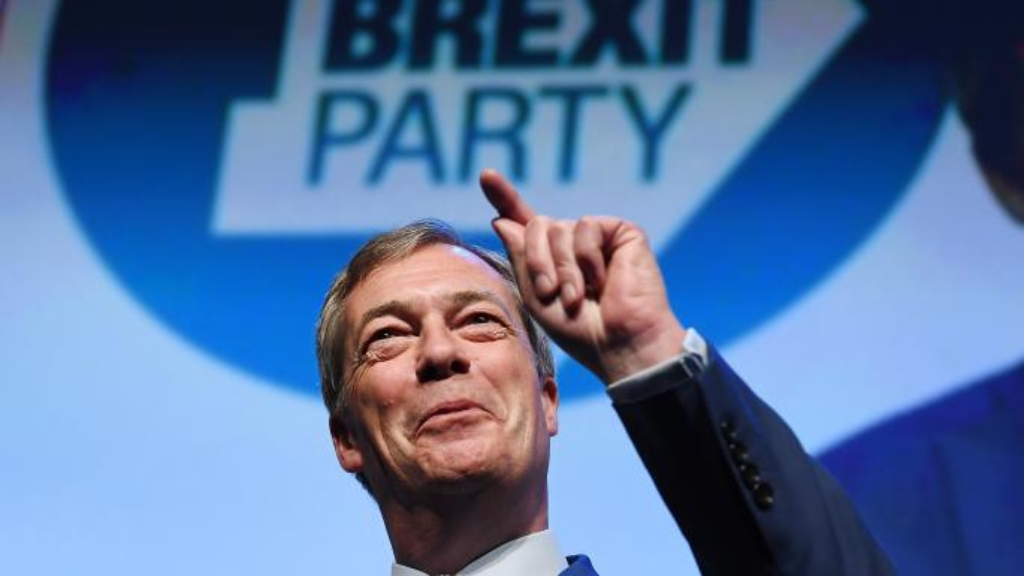
Nigel Farage’s Brexit Party, which was founded just four months ago, scored big wins in the British round of elections to the European Parliament, while Labour came in third and the Conservatives came in far behind in fourth place, deepening the Tory political crisis as the process for selecting a new leader begins:
Britain’s new populist Brexit Party was on course to win the country’s European Parliament elections, according to early results released on Sunday, further roiling the already turbulent politics of a country polarized over its failed effort to leave the European Union.
Led by Nigel Farage, the Brexit Party’s strong performance humiliated the governing Conservatives, whose leader, Prime Minister Theresa May, on Friday announced her resignation after almost three troubled years in power.
The 28 member countries of the European Union voted from Thursday to Sunday for the European Parliament, the bloc’s only directly elected institution, which has extensive powers over legislation. The individual country votes often serve as a gauge on important domestic issues.
The results in Britain were a striking success for a party that has existed for only a few weeks, and for Mr. Farage, the campaigner for British withdrawal from the European Union. He is one of the country’s most divisive politicians but also one of its most effective communicators.
The elections also looked set to deal a crushing blow to the opposition Labour Party as it lost votes to two center-left opponents, the Liberal Democrats and Greens, which both took a clearer position against Brexit and supported a second referendum on the issue.
With many of the votes counted, the Brexit Party was ahead with 31.5 percent of the vote. The Liberal Democrats were second with 20.5 percent, followed by Labour with 14.1 percent and the Greens with 12.1 percent. The Conservatives pushed into fifth position with 9.1 percent of the votes.
The Conservative Party’s dire performance will increase pressure on those campaigning to succeed Mrs. May to take a hard-line approach to Brexit that could result in the country leaving the European Union without any agreement.
By contrast, Labour’s setback is also likely to spur recriminations and prompt calls for it to push more explicitly for another referendum on Brexit.
In effect, voters appear to have flocked to parties that either took an uncompromising stance in favor of Brexit, or those that oppose it altogether — abandoning the Conservative Party and Labour, which have, in their different ways, been trying to offer some sort of compromise.
(…)
It foundered largely over a backup plan tying the whole of the United Kingdom to European customs rules until an alternative system could be found to prevent checks on the Irish border. That idea infuriated Brexit supporters who abhor the idea of staying tied to some of Europe’s rules, possibly indefinitely.
Mr. Farage’s Brexit Party prospered by offering a clear and simple message: that Britain must leave the European Union at the end of October, without any agreement if necessary, whatever the economic costs.
Speaking late Sunday after he was re-elected to the European Parliament, where he has been a member for 20 years, Mr. Farage said that his Brexit Party wanted a role in the discussion on withdrawal from the bloc.
“We want to take responsibility for what’s happening, and we’re ready to do so,” he said, adding that Britain should leave when the next Brexit deadline expires.
“If we don’t leave on October 31, then the scores you’ve seen for the Brexit Party today will be repeated in a general election, and we are getting ready for it,” Mr. Farage said.
More from The Guardian:
An insurgent Brexit party and reinvigorated Liberal Democrats have delivered a harrowing night for the Conservatives and Labour at the European elections, prompting profound soul-searching at the top of both major parties.
Nigel Farage’s Brexit party humiliated the Conservatives in their rural heartlands but also made sweeping gains in cities such as Cardiff, Leeds and Sheffield, as well as in Hillingdon, the home of Boris Johnson’s seat, where the Tories were pushed into fourth.
Farage’s success campaigning in favour of a no-deal Brexit is likely to push the Conservative leadership candidates into hardline positions on leaving the EU.
Jeremy Hunt, the foreign secretary, warned that the Conservative were facing an “existential threat”, while Johnson said it was a “crushing rebuke” to the government’s failure to take the UK out of the EU.
The night also confirmed an extraordinary revival of the Lib Dems, who overtook the Tories in Theresa May’s Maidenhead seat and came first in Jeremy Corbyn’s north London home of Islington.
Overnight, the Brexit party gained 28 seats, with the Lib Dems in second on 15 seats. Labour held 10, having lost seven so far, the Green party won seven, a gain of four, and the Tories were languishing in fifth place, with just three seats.
The results so far show that the hard Brexit vote totalled 36.8% – with the Brexit party on 33.3% and Ukip on 3.5%. The overall total for pro-leave parties was up at 45.6% including the Conservatives on a historically low 8.8%.
The pro-remain vote added up to 41.5% – with the Lib Dems on 20.9%, the Greens on 12.5%, the SNP on 3.5%, Change UK on 3.6% and Plaid Cymru on 1%. Labour, which tried to appeal to both sides with a soft Brexit pitch or a possible confirmatory referendum, was on 14.6%.
The punishing result for Labour is likely to prompt Corbyn’s critics to question again the Brexit strategy he and his advisers have pursued, with recriminations likely to spill into the open in the coming days.
The shadow foreign secretary, Emily Thornberry, said Labour must radically readdress its Brexit policy and campaign for a second referendum, and shortly afterwards Corbyn vowed the party would reflect on the results.
The Labour leader said: “After three years of Tory failure to deliver a Brexit that works for the whole country, these elections became a proxy second referendum. Over the coming days we will have conversations across our party and movement, and reflect on these results on both sides of the Brexit divide.”
A triumphant Farage, re-elected to the European parliament in the South East, said his party had achieved a historic result. The Brexit party won all of the regions in England, apart from London, as well as Wales, and took almost 2 million more votes than their closest rivals, the Lib Dems.
“Never before in British politics has a new party launched just six weeks ago topped the polls in a national election,” Farage said.
“There’s a huge message here, massive message here. The Labour and Conservative parties could learn a big lesson from tonight, though I don’t suppose that they actually will.”
Here are the latest results, via The Guardian:
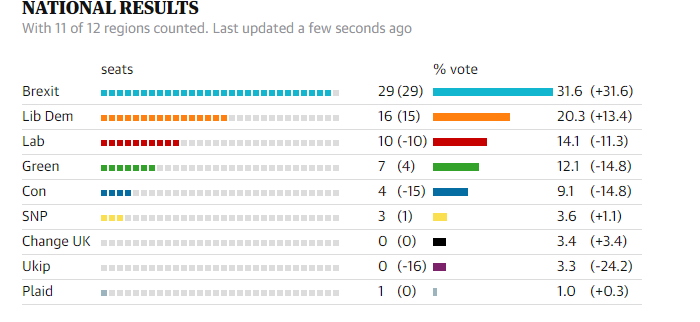
The biggest takeaway from these results is the fact that both of the major parties, Labour and the Conservatives suffered while Brexit and the Liberal Democrats gained significantly. This suggests that, after three years of watching the Conservatives stumble towards Brexit while Labour, which like the Tories had officially been in favor of remaining in the European Union during the Brexit Referendum but, on a dime, switched to being pro-Brexit, basically sat on the sidelines. In the meantime, Theresa May managed to negotiate a deal with the E.U. only to see it rejected by the House of Commons, which led to a historic intra-party challenge to her leadership that she survived, but which nonetheless left her bruised and battered. Meanwhile, polling showed increasing uncertainty about Brexit itself.
It’s likely for these reasons that the two biggest winners of these elections turned out to be the until now seemingly dormant Liberal Democrats, who have been consistently opposed to Brexit, and the Brexit Party itself, which is of course in favor of Brexit. With both major parties, though, the transformation has never seemed genuine. Labour Party leader Jeremy Corbyn specifically has been criticized for what many have seen as an effort to please both sides of the debate. May and her allies in the Conservative Party, meanwhile, have handled the task of guiding the nation to Brexit with at best begrudging enthusiasm, a fact that shows in the manner in which she has been rebuked for what has largely been a ham-handed effort to gain support for something that she most likely is opposed to as much as she was during the campaigning for the Brexit referendum. If nothing else these results show that the British public is frustrated with how Brexit is going and have lost confidence in both of the major parties.
The biggest question that these results leave us with, of course, is the question of what impact all of this may have on British politics and on the Brexit process itself.
On the first point, it’s worth noting that the nation is not required to hold a General Election until the summer of 2022 unless the Conservatives lose a no-confidence vote in the House of Commons. By then, presumably, the Brexit process will be over with one way or the other. At that point, one wonders what will become of the Brexit Party. In post-election comments last night, Nigel Farage said that the Brexit Party will be around for the next General Election, though. That should make things interesting since it will be the consequences of Brexit, if it happens, that will ultimately be at issue in that election. Of course, if Brexit doesn’t happen before then for some reason then an early General Election seems more likely and the Brexit Party is likely to become more powerful.
Even before 2022, though, it’s likely that the results of this election will have an impact on the internal politics of both the Labour and Conservative parties in a way that is likely to have an impact on British politics over the next three years.
For Labour, these disappointing results are likely to increase pressure on party leader Jeremy Corbyn to take a more solid position on Brexit and stop sitting on the sidelines as he and the party have done for most of the past three years. Additionally, the results could lead to questions about Corbyn’s leadership that have been circulating among Labour Party elites since he was first elected to the leadership role. For many of these people, Corbyn has always been too far left, and too acerbic, to be able to lead the party to a national win in a General Election. As a result, there have long been rumors about efforts to oust him, although nothing formal in that regard has ever actually manifested itself. With these numbers showing the party garnering just over 12% of the vote nationwide, it seems likely that the doubts about Corbyn’s leadership are only going o continue to grow.
Even more so than Labour, the Conservative Party is likely to be shocked by these disappointing results even though pre-election polling was showing that this is exactly what would happen. The fact that the Brexit Party scored such big wins will likely be taken as a sign of the mood of the British public and reinforce the position of hard Brexit supporters inside the Conservative Party such as Boris Johnson, who increasingly seems like the man to beat in the race to replace Theresa May as leader of the Tories. This is especially true given the fact that Farage’s Brexit Party scores a strong third-place in hypothetical General Election polling and its position is only likely to be enhanced by the results announced last night.
As James Joyner noted in his post this morning about the outcome of the elections across the continent, the results inside the United Kingdom seem to clearly indicate that, at least, for the moment, the British public is not pleased with what they’re seeing from the two mainstream parties. This is likely the main reason that parties representing the extremes of the Brexit debate — the pro-Brexit side represented by Farage and the anti-Brexit side represented by the Liberal Democrats, Greens, and, in Scotland, the Scottish National Party which threatens to make another push for Scottish independence if Brexit comes to pass — are the ones that the voters turned to in these elections. While these election results won’t do much to change the direction of British elections, they are sending signals to both major parties. The question is whether anyone is listening.


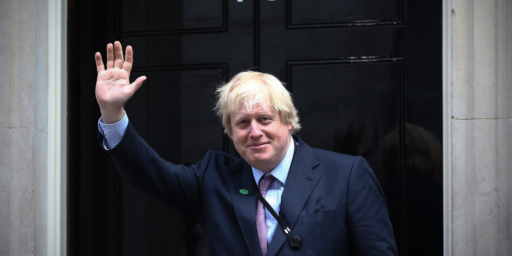
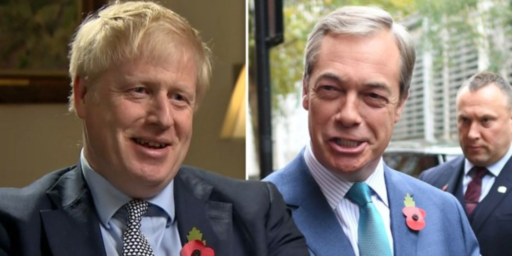
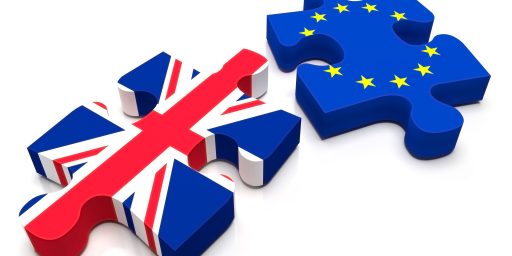
In the UK as in the US we’re witnessing attempted national suicide. Whether it’s a successful or unsuccessful suicide is TBD.
@michael reynolds: I was just thinking the exact same thing.
The problem is that at some point dear ol’ Nigel is going to, in fact, do something. He and his minions can babble on as much as they want about “a clean Brexit exit”. At some point they’re going to have to deal with exactly how to do it and what they plan to do for the after-effects.
I suspect that Farage is enough of a demagogue that as soon as the U.K. starts getting hit with the side effects (lack of certain pharmaceuticals, dwindling or non-existent supplies of certain perishables, increased delays at shipping ports) Farage will immediately blame the EU for not having provided the U.K. with a cake-and-eat-it solution. And his followers are dumb enough to go along with it.
The Brexit party surge seems to be vastly oversold. One must remember that in the last Euro elections, the Brexit hardline forces resided in the UK Independence Party – who actually “won” that election, just as the Brexit party did now. UKIP went from 27.5% to 3.3% – all those voters simply moved over to the Brexit party.
Thus the combined Brexit/UKIP vote this time shows an increase of 7.4% for the hardline Brexiters since the last election – significant, but hardly earth-shattering. Especially when you consider that that is only half of what the Tories lost since the last electon (down 14.8%). And barely more than half of what the LibDems gained.
Leaving the Brexit divide aside for a moment – if we look at the traditional left right divide, we see the right coming in at a combined 44% and the left at 49.9% (leaving aside the regional parties). That is a significant shift to the left from the 51.4% for the right in the last Euro elections.
Indeed the headline percent to Farage’s party is deceptive, what’s as politically interesting is the massacre of Labour in favour of LibDem.
One has to wonder if finally within Labour activists they will realize their ex-Sov apologist needs ouster.
—ETA—-
FT Summary
https://www.ft.com/content/efb65b60-8000-11e9-9935-ad75bb96c849
Conservatives and Labour were eviscerated as pro-hard Brexit parties — Brexit and Ukip — polled 35 per cent, while anti-Brexit parties — Lib Dems, Greens, Change UK, SNP and Plaid Cymru — polled a combined 41 per cent.
—
Remain is divided across multiple parties.
Labour massacred due to Corbyniste weaseling on Brexit, everyone knows he’s anti-EU seeing it (more correctly than the Conservative activists) as a driver of capitalist favourable policy.
Also don’t forget that the only reason the Tories are in power are because of their stitch-up with the DUP.
Problems the DUP will be having.